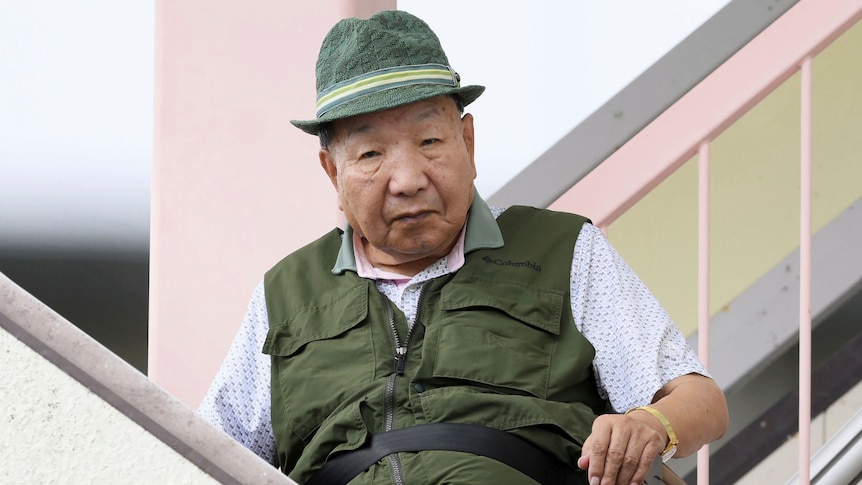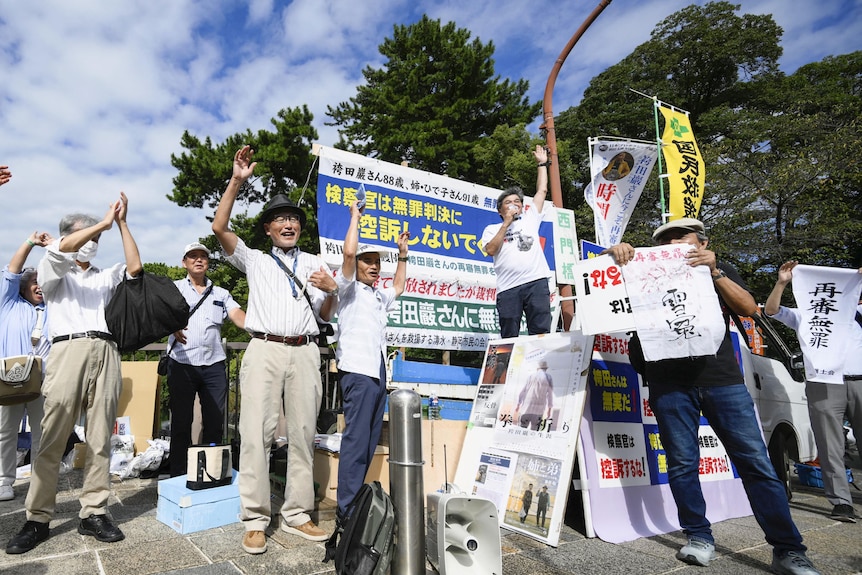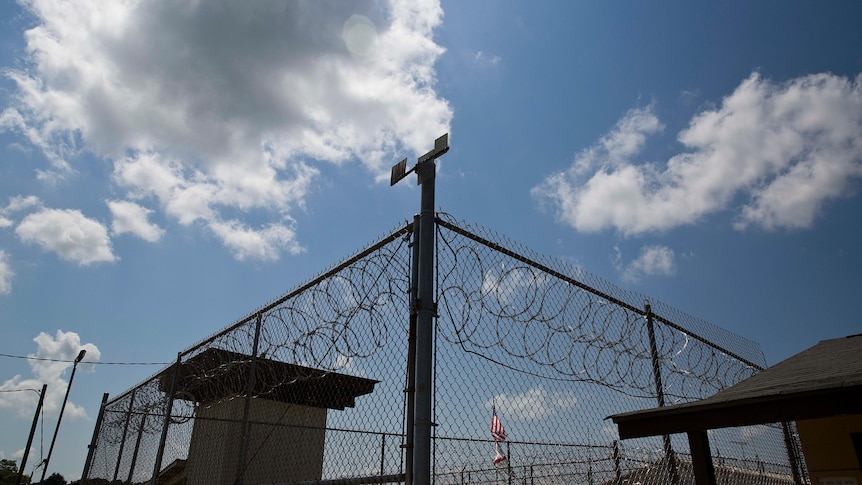Japanese man's acquittal after 48 years on death row puts nation's death penalty policy under spotlight
By Esther Linder with wires
ABC. AU

Iwao Hakamada was on death row for decades before his murder conviction was overturned. (Kyodo News via AP)
Iwao Hakamada was on death row for decades before his murder conviction was overturned. (Kyodo News via AP)
On Thursday, an 88-year-old Japanese man named Iwao Hakamada was acquitted of murder and released after 48 years on death row.
He could be the longest-serving death row inmate in the world, human rights groups say.
He was accused of murdering four people in 1966 but was exonerated after the evidence that initially convicted him was found to be planted or fabricated by prosecutors.
The case has sparked questions about the use of capital punishment in Japan and across the world.
What was the case against him?
Mr Hakamada was convicted of murder for the 1966 killing of an executive and three of his family members, and their home in central Japan being set on fire.
Lawyers, prosecutors, jurors and more believed Marcellus Williams may have been innocent. Missouri executed him anyway
The 55-year-old was sentenced to death in 2001 for killing Felicia Gayle, a former newspaper reporter found dead in her gated community home.
He was sentenced to death in 1968 by Shizuoka District Court, but was not executed due to the lengthy appeal and retrial process in Japan's notoriously slow-paced criminal justice system.
Following his arrest, Mr Hakamada initially denied the accusations, but then confessed. He later said his confession was forced during a violent interrogation by police.
"I have nothing to do with the case … I am innocent," he wrote in a letter to his mother while on trial in 1967.
He spent 48 years behind bars — more than 45 of them on death row — making him the world's longest-serving death row inmate, according to Amnesty International.
Acquitted after 48 years
Mr Hakamada was forced to wait 27 years for his appeal for a retrial to be heard, which was initially denied before a second request was granted in 2014.
A series of appeals through Japan's complex judicial system resulted in a Supreme Court decision to retry Mr Hakamada in October 2023, with the final decision being made this week.
On Thursday, the court concluded that five pieces of bloodstained clothing that investigators claimed to have found hidden in a tank of fermented soybean paste, or miso, a year after Mr Hakamada's arrest must have been planted, and did not match the accused's DNA.

Supporters of Iwao Hakamada celebrated outside the Japanese court after the 88-year-old was acquitted of murder. (Kyodo via Reuters)
Thursday's ruling also blamed the prosecutors for forcing Mr Hakamada into a false confession citing an "inhumane" interrogation lasting days.
Hideyo Ogawa, Mr Hakamada's lawyer, praised the ruling as "groundbreaking" for clearly stating that the prosecution fabricated key evidence at the beginning.
The court found that Mr Hakamada was not the culprit, Mr Ogawa said.
After Mr Hakamada was sentenced to death, he expressed fear and anger at being falsely accused.
"When I go to sleep in a soundless solitary cell every night, I sometimes cannot help cursing God," he wrote to his family.
"I have not done anything wrong .
"What a cold-blooded act to inflict such cruelty on me."
Most of Mr Hakamada's 48 years in prison, before being released in 2014 pending his retrial, were spent in solitary confinement.
Death penalty as punishment
Japan, alongside the US and Singapore, is one of a few democracies that continue to execute people as punishment for some crimes.
The case has drawn attention to and criticism of Japan's legal system.
UN experts call for first US execution by nitrogen gas to be halted
Photo shows A low angle view of the outside fence of Elmore Correctional Facility at daytime
Plans to execute a convicted murderer by asphyxiating him with nitrogen may amount to "cruel, inhuman or degrading treatment" or even torture, experts say.
Japan Bar Association chairperson Reiko Fuchigami urged the government and parliament on Thursday to promptly take steps to abolish the death penalty and lower hurdles for retrials.
"The Hakamada case clearly shows the cruelty of the wrongful death penalty, and the tragedy should never be repeated," she said.
An overwhelming majority of the Japanese public supports executions, according to a survey by the government.
Executions are carried out in secrecy in Japan and prisoners are not informed of their fate until the morning they are hanged.
In 2007, Japan began disclosing the names of those executed and some limited details of their crimes.
According to Amnesty International, 115 people are on death row in Japan. The last execution was carried out in July 2022.
The organisation's East Asia researcher, Boram Jang, said the Hakamada verdict was a "an important recognition of the profound injustice" Mr Hakamada endured.
“As we celebrate this long-overdue day of justice for Hakamada, we are reminded of the irreversible harm caused by the death penalty," she said.
"We strongly urge Japan to abolish the death penalty to prevent this from happening again."
Amnesty International estimated 1,153 people were executed in 2023, excluding China, with the majority of executions happening in Iran.
Australia abolished the death penalty in 1985. A federal law passed in 2010 prohibits its reintroduction.
He was sentenced to death in 1968 by Shizuoka District Court, but was not executed due to the lengthy appeal and retrial process in Japan's notoriously slow-paced criminal justice system.
Following his arrest, Mr Hakamada initially denied the accusations, but then confessed. He later said his confession was forced during a violent interrogation by police.
"I have nothing to do with the case … I am innocent," he wrote in a letter to his mother while on trial in 1967.
He spent 48 years behind bars — more than 45 of them on death row — making him the world's longest-serving death row inmate, according to Amnesty International.
Acquitted after 48 years
Mr Hakamada was forced to wait 27 years for his appeal for a retrial to be heard, which was initially denied before a second request was granted in 2014.
A series of appeals through Japan's complex judicial system resulted in a Supreme Court decision to retry Mr Hakamada in October 2023, with the final decision being made this week.
On Thursday, the court concluded that five pieces of bloodstained clothing that investigators claimed to have found hidden in a tank of fermented soybean paste, or miso, a year after Mr Hakamada's arrest must have been planted, and did not match the accused's DNA.
Supporters of Iwao Hakamada celebrated outside the Japanese court after the 88-year-old was acquitted of murder. (Kyodo via Reuters)
Thursday's ruling also blamed the prosecutors for forcing Mr Hakamada into a false confession citing an "inhumane" interrogation lasting days.
Hideyo Ogawa, Mr Hakamada's lawyer, praised the ruling as "groundbreaking" for clearly stating that the prosecution fabricated key evidence at the beginning.
The court found that Mr Hakamada was not the culprit, Mr Ogawa said.
After Mr Hakamada was sentenced to death, he expressed fear and anger at being falsely accused.
"When I go to sleep in a soundless solitary cell every night, I sometimes cannot help cursing God," he wrote to his family.
"I have not done anything wrong .
"What a cold-blooded act to inflict such cruelty on me."
Most of Mr Hakamada's 48 years in prison, before being released in 2014 pending his retrial, were spent in solitary confinement.
Death penalty as punishment
Japan, alongside the US and Singapore, is one of a few democracies that continue to execute people as punishment for some crimes.
The case has drawn attention to and criticism of Japan's legal system.
UN experts call for first US execution by nitrogen gas to be halted
Photo shows A low angle view of the outside fence of Elmore Correctional Facility at daytime
Plans to execute a convicted murderer by asphyxiating him with nitrogen may amount to "cruel, inhuman or degrading treatment" or even torture, experts say.
Japan Bar Association chairperson Reiko Fuchigami urged the government and parliament on Thursday to promptly take steps to abolish the death penalty and lower hurdles for retrials.
"The Hakamada case clearly shows the cruelty of the wrongful death penalty, and the tragedy should never be repeated," she said.
An overwhelming majority of the Japanese public supports executions, according to a survey by the government.
Executions are carried out in secrecy in Japan and prisoners are not informed of their fate until the morning they are hanged.
In 2007, Japan began disclosing the names of those executed and some limited details of their crimes.
According to Amnesty International, 115 people are on death row in Japan. The last execution was carried out in July 2022.
The organisation's East Asia researcher, Boram Jang, said the Hakamada verdict was a "an important recognition of the profound injustice" Mr Hakamada endured.
“As we celebrate this long-overdue day of justice for Hakamada, we are reminded of the irreversible harm caused by the death penalty," she said.
"We strongly urge Japan to abolish the death penalty to prevent this from happening again."
Amnesty International estimated 1,153 people were executed in 2023, excluding China, with the majority of executions happening in Iran.
Australia abolished the death penalty in 1985. A federal law passed in 2010 prohibits its reintroduction.

No comments:
Post a Comment